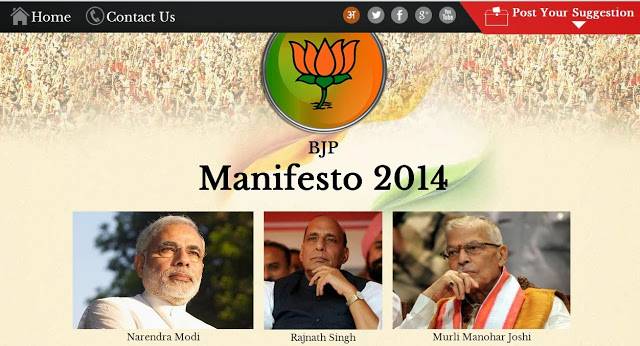India's opposition Bharatiya Janata Party (BJP), widely tipped to form the next government, pledged today to revise the country's nuclear doctrine, whose central principle is that New Delhi would not be the first to use atomic weapons in a conflict.
Unveiling its election manifesto, the party gave no details, but sources involved in drafting the document said the "no-first-use" policy introduced after India conducted a series of nuclear tests in 1998 would be reconsidered. Arch-rival Pakistan, which responded within weeks that year by conducting tests of its own, does not profess "no first use".
The BJP, which ordered the tests in 1998, said it would seek friendly relations with neighbours, but without naming any country vowed to "deal with cross-border terrorism with a firm hand" and take a "strong stand and steps" when required. Opinion polls have said the BJP will emerge as the single biggest party in the five-week election that began today, but may fall short of the majority required to rule. A BJP-led coalition government is the most likely outcome, they have said.
Setting out its Hindu nationalist leanings, the party vowed to explore building a temple at the site of a mosque in northern India that was torn down by zealots 22 years ago, potentially putting a deeply controversial issue back into play.
"There's a religious right in the BJP so they want to acknowledge that without making it the centerpiece of the manifesto," said Ashok Malik, a political columnist. "I don't think the BJP is going to take it forward as a political movement."
The party made a commitment to withdrawing a special autonomous status accorded to Jammu and Kashmir state, India's only Muslim-majority region, which many in the BJP believe prolongs ambiguity over the status of a territory claimed by Pakistan.
It added that it would aim for the return of Hindus who left Kashmir when the region was roiled by insurgency. The BJP accused the left-leaning Congress party, which has led the country's ruling coalition for the past decade, of "weak and spineless" leadership.
"Instead of creating a socio-economic and political paradigm of governance drawn from the civilisational consciousness of India, the leaders tried to follow whatever was being practiced in this or that Western country," it said.
It said it would link welfare programmes introduced by the Congress party to asset creation, and would review the country's strong labour laws. It said it would encourage foreign direct investment, but made clear it was not in favour of opening the retail sector to foreign supermarket brands such as Wal-Mart Stores Inc and Tesco Plc.
"It is unfortunate and a massively regressive decision," said a senior official at Trent, the local partner of Tesco, the only foreign retailer to have committed to setting up a chain of stores in India. "It is difficult to understand what happens next, just now, because we need some clarity on what they are saying. Whether they will scrap the policy or whether they will just not allow anyone new to apply," he said.
The BJP opposes foreign investment in the retail sector to protect small businesses and traders, many of whom are its supporters. However, a party source said it was highly unlikely that the BJP would roll back the legislation introduced by Congress allowing global retail chains to set up in India. The BJP also promised a massive emphasis on reviving India's creaking infrastructure with plans to build 100 new cities, a high-speed rail network, and a 10-year-plan to roll out low-cost housing to every Indian family.






